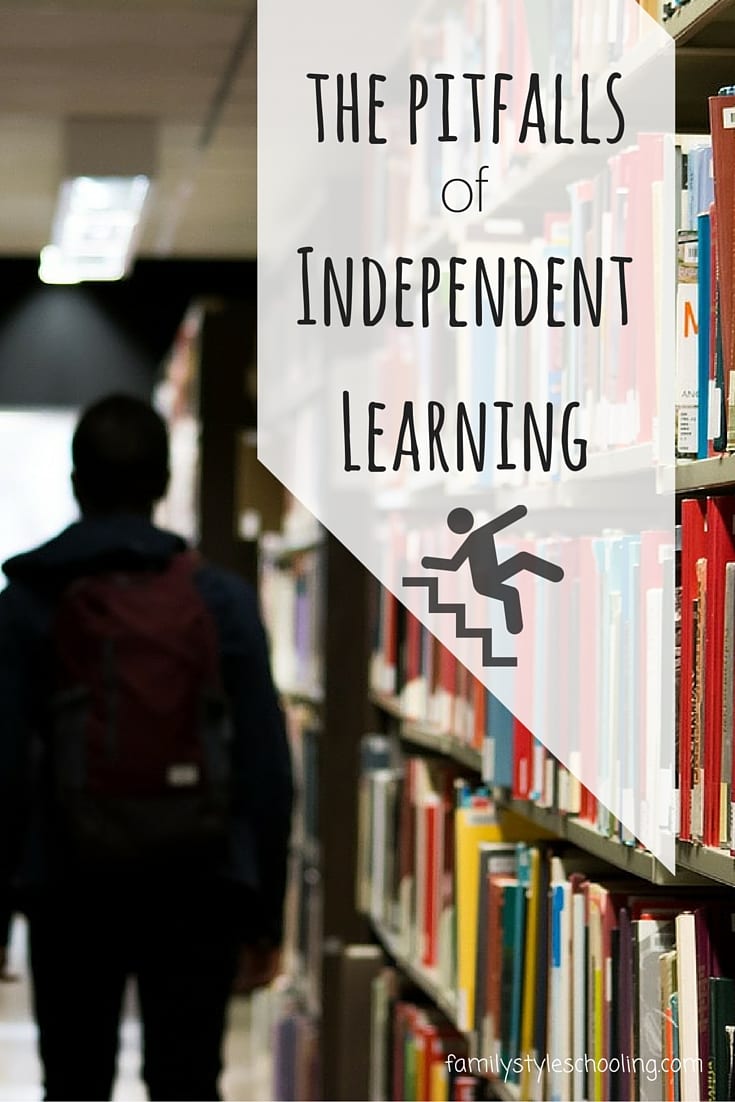The Pitfalls of Independent Learning
As a homeschooling mom trying to raise and launch a strong and independent young person, the blessings of independent learning seem to be the ticket to success. One of the reasons colleges are starting to look at homeschoolers differently is due to the fact that they have study skills that come from learning on their own. While independence in study can cultivate some excellent habits, it can also inadvertently disconnect teacher from student, and become isolated learning. Here are five things to consider before allowing your student to continue learning on their own to ensure that your student is on the right path, so that you can launch a confident learner when the time comes.
No. 1 - Is it for Them or for You
You have to start with a difficult question: Are you pushing independent learning to benefit yourself or your student? You might say that your answer is both. Of course if you're teaching multiple children, or you work part time, logistically you have to allow them to do some things on their own. I understand that. My question is more about having a serious heart check, and assessing if your decision to allow them independence is for their good, or simply because it just makes life easier for yourself.

I ask this because I've been there. It is much easier to send them off on their own so you can get things done. The road to independent learning is just that...it's a road. You don't magically arrive at a day when you can just send them off on their own. There are many stops and starts along the way. Launching them requires training wheels in the beginning. As their teacher, you'll need to assess their ability to be excellent while independent. It's okay to let them fall, but it's not okay to let them continue to flail. This doesn't mean you have to be a helicopter, but don't get lost in the bliss of independent learning. It won't be great when you realize a year later that the learning you thought was happening was just for looks.
No. 2 - Conversations Go a Long Way
So your student is reading and working their way through their assignments and seeming to really be enjoying the work. A quick conversation can help you assess whether they are understanding the material. If they can't communicate the basics, maybe they're going too quickly.
My middle daughter is a very independent learner, and seemed to be working through her math with confidence and ease. It wasn't until I started asking a few questions about adding fractions that I realized she had missed some fundamentals that were crucial to her success in later math. We're taking the time to go back over those ideas together in a discussion format. For now, she needs a little help, and that's okay.
No. 3 - Inspect what you Expect
So they're cruising along in their studies and you're encouraged by their progress, but you're not reading the papers they're writing or grading the tests they're taking. I'm not talking about your elementary students here, but more of your middle school or high school students. If you're expecting them to complete a task, make sure to put your eyes on it.

Even though they may be a wonderful student, by not looking at their work, you're creating an unnecessary opportunity for deceitfulness. If they're feeling unsure about the work they're doing, and they know you're not going to be looking, you're just making it too easy for them to not follow through. Set them up for success by following through on inspecting what you've asked them to do. You're in this together, and they need you to be the enforcer.
No. 4 - Independent Learning Isn't for Everyone
There is no magical formula for success in homeschooling. Every student is a human being, thus their education should be unique, and not something that can be mass produced conveyor belt style. John Taylor Gatto stated:
There isn't any known way to bulk-educate; it's all custom work.
Every student is on their own educational journey. Sometimes we get carried away in comparing our students to other students, or your family's success/failure to the apparent success/failure of another family's educational journey. We can't elevate independent learning above the good of our student.
However, sometimes you need a partner in your corner. This still doesn't give you freedom to completely disappear from the process, but here are some great options for extra help:
- Mr. D's Math - a live math tutor with online support through high school math.
- Literature: Old World Culture - a video series by Roman Roads media that walks students through the great books of Western Civilization.
- Discovering Music - a video course that travels through Western Civilization connecting music, art, history and economics.
- iTunes Open University - a database of free courses students can work their way through.
Whatever resource you choose, if you're not employing a live person to help you, you'll still need to keep an eye on what's happening.
No. 5 - Failure isn't a bad thing
Somehow our generation has bought the idea that if you should be doing something, you should be able to do it perfectly. Failure is inevitable. Actually, failure is a good thing, as long as you're willing to learn from your mistakes. All of the people that we look up to as experts in their field have a series of potholes and speed bumps along their journey to the top.

Most wonderful innovations have come from facing adversity. Don't avoid independent learning because you think they won't be able to do it successfully. Expect failures along the way. With each failure, encourage learning from their mistakes instead of shaming their stumble.
Don't beat yourself up either. You're in this journey together. You're a team. Be the example of learning from failure and show them what it looks like to dust yourself off and try again.
Chart Your Own Course
I think above all else, you have to decide what works best for every student in your charge. It's so easy to get drawn in to following after the pattern of someone you've seen do something in a way that appeared successful. Each of us must have a vision for our students and work towards that goal.
How do you manage independent learning in your home?
Betsy Strauss is an unexpected homeschooler, mother of three, who is in a relationship with a sweet man for life. She loves reading books, drinking coffee, and learning anything with her kids.



I think this is a GREAT post — and you point out some hard truths for parents. This is my favorite thing you’ve written so far!
Thanks Mary!
Hi Betsy. It is so encouraging to read your thoughts on independent learning. Staying in touch with my teen aged children is important to me but it can be easy to fall into the trap of all going our separate ways. Young people still desire guidance and I am thankful to maintain closeness with the ones we’ve had the pleasure of “raising”!
This is a great post. It really points out some important aspects to consider when looking at independent learning.
This is a great post and something that has been heavy on my heart – and one of the reasons that I do not like classical conversations – even though we still do it.